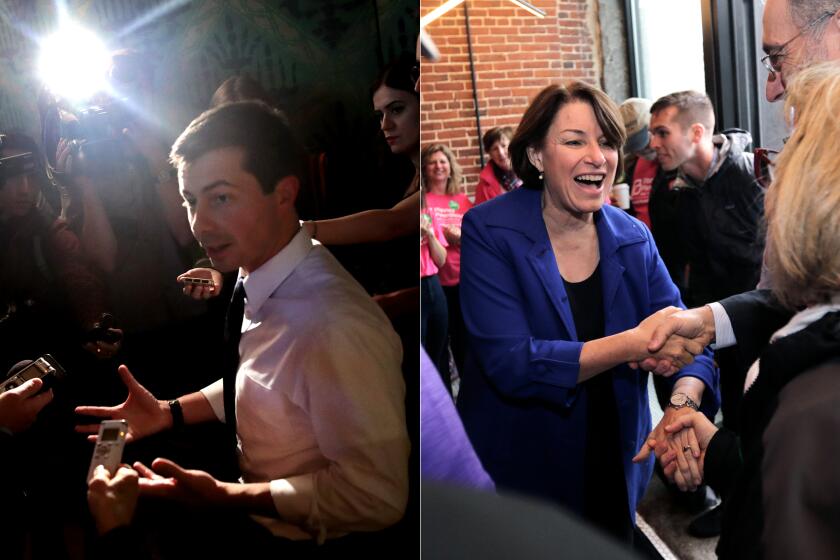Can Elizabeth Warren afford to be all in on ‘Medicare for all’?

WASHINGTON — Elizabeth Warren built her brand on confronting government’s most vexing challenges with plans that sell sweeping change as common sense. But every day that a workable solution to the nation’s healthcare woes eludes Warren, that brand risks erosion.
For weeks she caught flak for hedging when asked who will cover the immense price tag for the “Medicare for all” system she has endorsed in principle.
In an effort to still the criticism, Warren is now promising to produce a detailed blueprint laying out how she would make it all pencil out. Doing so could give the candidate her biggest political test since she surged to the front of the large pack of Democratic White House hopefuls.
Warren is caught between two powerful forces. On the one side, progressives expect her to stick to her pledge to pursue a far-reaching plan similar to the one proposed by Sen. Bernie Sanders of Vermont. On the other, her identity as the candidate of detailed policies means she can’t easily avoid the fine print, which is full of political peril.
“She’s painted herself into a corner,” said Gerald Friedman, a University of Massachusetts economist whose research is often cited to support Medicare for all. “She wants Medicare for all, but she didn’t think through the politics.”
Friedman said Warren has put herself in a bind with her reluctance to say whether or not new, broad-based taxes would be required -- and whether the path to universal care could be gradual and involve stopovers in the types of healthcare systems her centrist rivals champion.
It is the same reckoning faced by some of Warren’s rivals who also enlisted in the Medicare for all crusade. Sanders likes to say he “wrote the damn bill.” Warren is now left struggling with the darn price.
If all medical costs were shifted to the government -- doing away with private insurance and out-of-pocket costs for families -- the crushing healthcare costs many Americans now face would disappear. The trade-off would be taxation at a level this nation has never seen.
People in other wealthy countries find Americans’ health insurance deductibles hard to understand.
The senator has been zigzagging on healthcare since launching her campaign. She has vacillated from saying many options should be on the table and the path forward should be worked out by consensus, to rhetorically linking arms with Sanders on a debate stage and declaring “I’m with Bernie” on the issue.
The maneuvering bought Warren time as rivals like Sen. Kamala Harris of California felt the wrath of voters for walking back their support for the Sanders plan.
But her reluctance to answer direct questions in the debates about financing her healthcare plan has provided a sharp contrast with her willingness to get into the policy weeds on every other issue. After rival candidates pressed her on the issue at the most recent debate, Warren announced for the first time that a detailed plan would be forthcoming.
Now, as Warren’s policy staff goes into lockdown hashing out the details, their dilemma is evident in the expectations of others in Warren’s orbit:
Progressive stalwarts are certain she will deliver on the Sanders promise, using some of academia’s most optimistic cost projections and perhaps a slightly less aggressive timetable than her rival to make the case that the job can be done without creating new financial burdens for the average American family.
Her allies closer to the mainstream anticipate she will move toward something less radical.
There is broad agreement that trying to follow through with what Sanders laid out would be a heavy lift.
“I can’t think of any change to the country’s tax system that has been that big all at once,” said Leonard Burman, a professor of public administration at Syracuse University who was a top tax official in the Clinton administration.
Medicare for all as envisioned by Sanders is not simply a matter of shifting existing costs. It would almost certainly increase the amount the nation spends on healthcare overall, largely because of the extensive added benefits it promises with no caps on care or co-payments, benefits that go beyond those offered by other wealthy countries.
According to a new report by the Urban Institute, a liberal think tank in Washington, the price tag for a plan like Sanders’ would come to about $34 trillion over 10 years. For comparison, the entire federal government is currently projected to spend about $58 trillion over the next 10 years, according to the nonpartisan Congressional Budget Office.
“This would be a significant departure of not just how we do things here now, but it is quite beyond what we see in the vast majority of other developed countries,” said Linda Blumberg, one of the report’s authors.
Even the imposition of a Scandinavian-style value-added tax, in which 25% is tacked onto the cost of most products sold, would raise only half of what the Urban Institute projects is needed, Burman said. There would likely need to be stiff new payroll and other taxes as well.
“Wealth taxes” could cover a chunk of the tab. But Warren, who has proposed one of the most aggressive levies on the rich, already has announced plans to spend that money elsewhere, on priorities such as day care for children and free college.
Alternatives for reducing the price tag, such as making benefits less generous or requiring people to pay some level of premium or co-payment, could significantly reduce political support for the plan.
Doubts about the costs of Medicare for all may already be giving voters pause. Any growth in enthusiasm for all Americans getting their healthcare from a single government plan has stalled out, with the nation now almost evenly divided, according to a Kaiser Family Foundation tracking poll.
Support of a “public option” – sometimes branded Medicare for all who want it – is considerably higher, with 73% of Americans in favor. Among just Democrats, significantly more “strongly favor” a public option (63%) than Medicare for all (42%).
Midwestern moderates Pete Buttigieg and Amy Klobuchar are making a strong case against the liberalism of Sens. Elizabeth Warren and Bernie Sanders.
But Warren is still shoring up her bona fides with progressives, and drifting away from Sanders’ position on Medicare for all could be a deal breaker for many of them.
“She’s concerned about losing that group of people who worry if she doesn’t stand tall on this one, she won’t be standing tall on any of these issues,” said Robert Blendon, a professor of health policy and political analysis at Harvard’s School of Public Health.
Such voters were easy to find at a recent Sanders rally in Queens, N.Y., where he unveiled the endorsement of Rep. Alexandria Ocasio-Cortez, a progressive champion.
“I don’t trust that she cares enough about these policies to see them through,” said CJ Johnson, a 23-year-old software engineer who was at the rally.
Warren is balancing such anxieties with those of more centrist voters migrating to her from candidates like California Sen. Kamala Harris. Her uncharacteristically murky stance has provided multiple opportunities for attack.
Mayor Pete Buttigieg of South Bend, Ind., likes to highlight how the senator prides herself on having a plan for everything, but not healthcare.
But that lack of detail has been embraced by some of Warren’s more establishment-oriented admirers.
“Give her some time,” former Senate Democratic leader Harry Reid of Nevada said recently on the podcast of David Axelrod, former political advisor to President Obama, when conversation turned to Warren’s support of Medicare for all. “I think that she’s not in love with that, I think that she, you’ll wait and see how that all turns out…Oh I know she’s pragmatic, just wait.”
The root of the dilemma lies in the identity Warren has carved out as a policy expert.
“Presidential candidates have run on big plans for years without describing the details,” Blendon said, citing Bill Clinton and Trump.
But when details are the candidate’s brand, Warren is finding, there is only so long they can be avoided.
More to Read
Get the L.A. Times Politics newsletter
Deeply reported insights into legislation, politics and policy from Sacramento, Washington and beyond. In your inbox three times per week.
You may occasionally receive promotional content from the Los Angeles Times.














